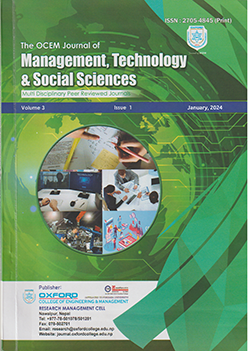
The Impact of The Induction Programme on New Teachers’ Retention Intention in Chitwan District Nepal
1Basanta Prasad Adhikari, 2Nilam Adhakari Rajak
Research Department, Oxford College of Engineering and management, and Saraswoti Kendra Nepal
Email: adhikaribasantaprasad@gmail.com
Abstract
This study aimed to examine the impact of the key components of the induction programme on new teacher retention intention in Nepal. Specifically, it examined new teachers’ opinions, views, perceptions, and experiences of the induction programme’s key components and how they are related to gender and retention intention in the profession. This study used an integrated mixed methods approach with the simple random sampling method used as a sampling strategy. In total, 250 new teachers were randomly selected from 15 private and 15 public schools in Chitwan district, Nepal. The response rate of the survey questionnaire was 84%. Eleven new teachers in total were selected to take part in the semi-structured interviews who also already participated in the survey study. The quantitative survey instrument was a self-administered Likert-type questionnaire developed based on the previous studies addressing the key components of the induction programme. Principal component analysis (PCA), Student’s t-test, Mann-Whitney U-test, and Binary Logistic Regression analysis were used to analyze quantitative data, and the inductive content analysis method was applied to interpret the qualitative interview data.
The results showed that 72% of new teachers stated their retention intention in the profession, and 28% stated their turnover intention, which is less than the international attrition rate of 30-50 %. The quantitative results further indicated that highly task-oriented school principal management behaviour, collegial support to increase content knowledge, high expectations of teacher performance, and emphasis on effective teaching skills have a negative association with new teachers’ retention intention in the profession. Conversely, collegial support for instructional skills, recognizing and comfortable working atmosphere, and well-working observation mechanisms have a positive association with new teachers’retention intention in the profession.
The qualitative results supported the quantitative results’ low mean values, indicating new teachers’ dissatisfaction with Nepalese induction support. Overall, the qualitative data contributes to a more comprehensive and nuanced understanding of the association between the perceptions of new teachers regarding the key components of the induction programme and their retention intention in the profession and validates the interpretations of the quantitative results. The findings of this study would be beneficial to school leaders, policymakers, and practitioners in finding appropriate solutions to the problem of new teacher attrition.
Keywords:Induction programme, teaching profession, newly qualified teachers, turnover intention, teacher retention, and attrition
